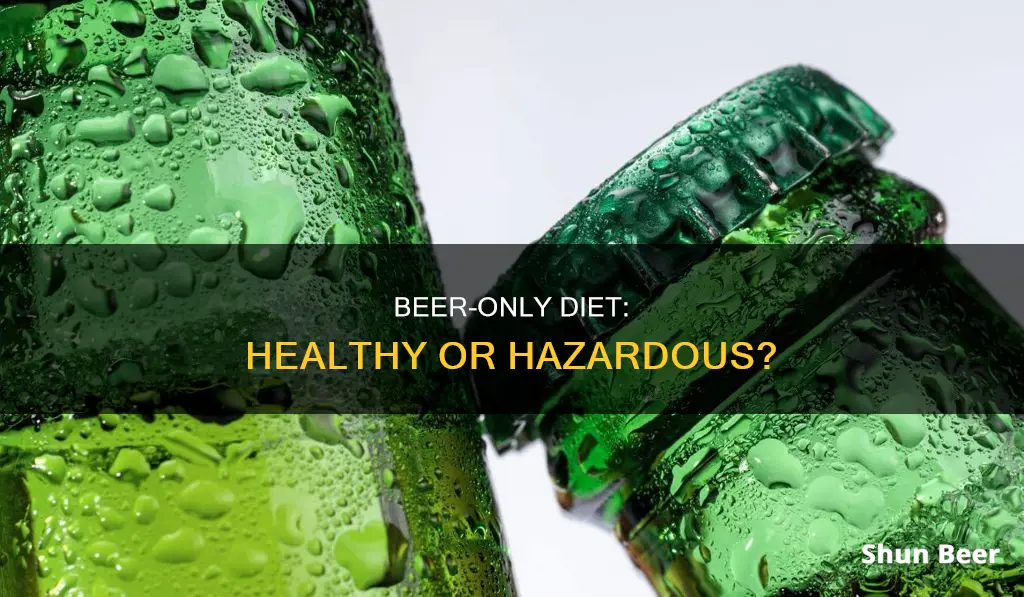
Drinking beer instead of water is a topic that has been widely discussed and debated. While beer contains water, the alcohol it contains is a diuretic, causing the body to lose water and leading to dehydration. In addition to dehydration, a beer-only diet would also result in vitamin and protein deficiencies, with potentially fatal consequences.
| Characteristics | Values |
|---|---|
| Survival | A few months |
| Dehydration | Likely to occur in a matter of days or weeks |
| Deficiency | Vitamin C, A, D, E, K, thiamine, protein, fat |
| Liver disease | Risk increases with chronic alcohol use |
What You'll Learn
- Dehydration: Alcohol is a diuretic, so despite the water content in beer, you would likely die of dehydration in a matter of days or weeks
- Scurvy: Beer contains little to no vitamin C, and the alcohol causes you to urinate faster, increasing the risk of scurvy
- Protein deficiency: Beer contains almost no protein, which could cause muscle wasting and anaemia
- Vitamin deficiencies: Beer is notably deficient in vitamins A, D, E, and K, as well as thiamine
- Liver failure: While this would take longer to occur, liver disease is a serious risk of chronic alcohol use

Dehydration: Alcohol is a diuretic, so despite the water content in beer, you would likely die of dehydration in a matter of days or weeks
Alcohol is a diuretic, which means it signals your body to flush out water by urinating. Alcohol also suppresses the anti-diuretic hormone that signals your body to keep water cycling through your system. This two-pronged attack by alcohol on the body's water retention systems means that, despite the water content in beer, you would likely die of dehydration in a matter of days or weeks. The speed of dehydration would depend on the strength and volume of beer consumed.
Dehydration is one of the primary ingredients of a nasty hangover. So, if you're drinking beer, it's important to also drink water to stay hydrated.
In a survival situation, drinking beer is better than nothing. But, as a general rule, you should be drinking water. Drinking only alcohol will kill you.
Beer Mail: Shipping Alcohol Straight to Your Doorstep
You may want to see also

Scurvy: Beer contains little to no vitamin C, and the alcohol causes you to urinate faster, increasing the risk of scurvy
Beer contains little to no vitamin C. In fact, a serving of beer contains between zero and 30 milligrams of vitamin C, depending on the recipe. The alcohol in beer also causes drinkers to urinate faster, increasing the risk of vitamin C deficiency.
Vitamin C is an essential vitamin that is involved in important physiological cellular processes and tissue development. Humans are incapable of synthesising vitamin C and a deficiency can lead to multisystemic disease and death if left untreated.
Scurvy is the clinical manifestation of severe vitamin C deficiency. It is a condition that causes bruising, weakness, rash, fatigue and bleeding gums. While rare in the U.S., it can develop after 2-3 months of severe vitamin C deficiency.
Chronic alcoholism plays an important role in the development of vitamin C deficiency. In the UK, it is common practice to treat patients with chronic alcoholism who are admitted to the hospital with intravenous vitamins, including vitamin C, for 2–3 days, followed by oral vitamin tablets.
Therefore, if an individual were to drink only beer and never any water, they would be at a high risk of developing scurvy due to the lack of vitamin C in beer and the diuretic effect of alcohol.
Beer and Swollen Feet: Is There a Connection?
You may want to see also

Protein deficiency: Beer contains almost no protein, which could cause muscle wasting and anaemia
Beer contains almost no protein, which can lead to protein deficiency. This can cause muscle wasting and anaemia.
Protein deficiency can lead to a range of health issues, including muscle wasting and anaemia. As the body's largest reservoir of protein, muscles are particularly vulnerable to protein deficiency. When dietary protein is scarce, the body takes protein from skeletal muscles to preserve more important tissues and functions. This can lead to muscle wasting over time, especially in older adults.
Anaemia is another potential consequence of protein deficiency. While the role of pure protein deficiency is challenging to determine in humans due to its association with other nutritional deficiencies, studies in children with kwashiorkor have shown that haemoglobin concentration does not decrease until there is actual body wasting.
In addition to muscle wasting and anaemia, protein deficiency can also cause increased hunger, hair loss, skin, hair, and nail problems, a greater risk of bone fractures, stunted growth in children, and more severe infections.
Are Beer Chunks Safe to Drink?
You may want to see also

Vitamin deficiencies: Beer is notably deficient in vitamins A, D, E, and K, as well as thiamine
Beer is often viewed as a source of empty calories, but it does contain some vitamins and minerals. However, it is notably deficient in vitamins A, D, E, and K, as well as thiamine (vitamin B1).
Chronic alcoholic patients frequently suffer from deficiencies in folate, vitamin B6, thiamine, and vitamin A. Alcoholism can affect the absorption, storage, metabolism, and activation of these vitamins.
In addition to vitamin deficiencies, a diet of pure alcohol would lead to protein deficiencies. While beer provides enough calories to keep you moving, you would be severely malnourished.
The classic deficiency associated with alcohol consumption is Wernicke-Korsakoff syndrome, also known as beriberi, which can lead to amnesia, confabulations, and psychosis.
Another issue is folate deficiency, which can lead to anemia and have a compounded negative effect on the heart when coupled with an increased risk for atherosclerosis.
Vitamin A deficiency is also a concern, as alcohol actively depletes the liver stores of this vitamin. Deficiency causes night blindness and immunodeficiency.
Overall, while beer does contain some vitamins and minerals, it is not a good source of these nutrients compared to whole foods like fruits and vegetables. You would need to consume massive amounts of beer to meet your daily requirements, which would lead to other health issues.
Beer Overload: Health Hazards of Excessive Beer Consumption
You may want to see also

Liver failure: While this would take longer to occur, liver disease is a serious risk of chronic alcohol use
Liver failure is a serious risk of chronic alcohol use. While it would take longer to occur than other alcohol-related health issues, liver disease is a very real danger of drinking beer and never any water.
The liver is a resilient organ that is capable of regenerating itself. However, each time the liver filters alcohol, some of its cells die. The liver can develop new cells, but prolonged alcohol misuse over many years can reduce its ability to regenerate. This can result in serious and permanent liver damage.
There are three main types of alcohol-associated liver disease:
- Steatotic (fatty) liver: This is the most common alcohol-induced liver problem. It occurs when there is a build-up of fat inside the liver cells, causing the liver to enlarge. Steatotic liver rarely causes any symptoms, but it is an important warning sign that a person is drinking at a harmful level.
- Acute hepatitis: Alcohol-associated hepatitis is an acute inflammation of the liver, which can lead to permanent scarring.
- Cirrhosis: Alcohol-associated cirrhosis is the destruction of normal liver tissue, leaving scar tissue in its place. In this situation, the liver may stop functioning correctly.
The early stages of alcohol-related liver disease often have no symptoms. However, if symptoms are present, they may include pain or discomfort in the upper right side of the abdomen, fatigue, or unexplained weight loss. As the disease progresses, more obvious and serious symptoms can develop, such as:
- Yellowing of the skin and eyes (jaundice)
- Swelling in the legs, ankles, and feet due to a build-up of fluid (oedema)
- Vomiting blood and passing black, tarry stools
- Confusion and memory problems
If you regularly drink alcohol to excess, it is important to tell your doctor so they can check if your liver is damaged. Alcohol-related liver disease is very common, and the number of people with the condition has been increasing in recent decades due to increasing levels of alcohol misuse.
The best way to prevent alcohol-related liver disease is to stop drinking alcohol or stick to low-risk drinking guidelines. Even if you have been a heavy drinker for many years, reducing or stopping your alcohol intake will have important short- and long-term benefits for your liver and overall health.
Parked, Drinking Beer: Legal or Not?
You may want to see also
Frequently asked questions
No, you would likely die of dehydration in a matter of days or weeks, depending on the strength and volume of beer consumed. While there is plenty of water in beer, the alcohol's diuretic effect makes it a net negative in terms of hydration.
Aside from vitamin C deficiency, beer is notably deficient in vitamins A, D, E, and K, as well as thiamine, protein, and fat. If left untreated, beriberi (a thiamine deficiency) can trigger heart failure. Protein deficiency is another major risk, with the potential to cause muscle wasting and anemia.
You would likely live for a few months before the worst effects of scurvy and protein deficiency kick in.







